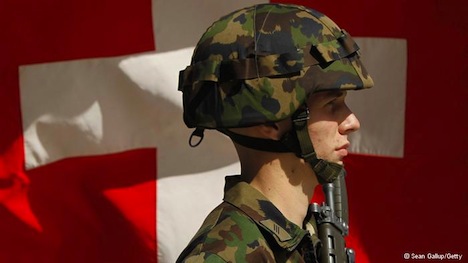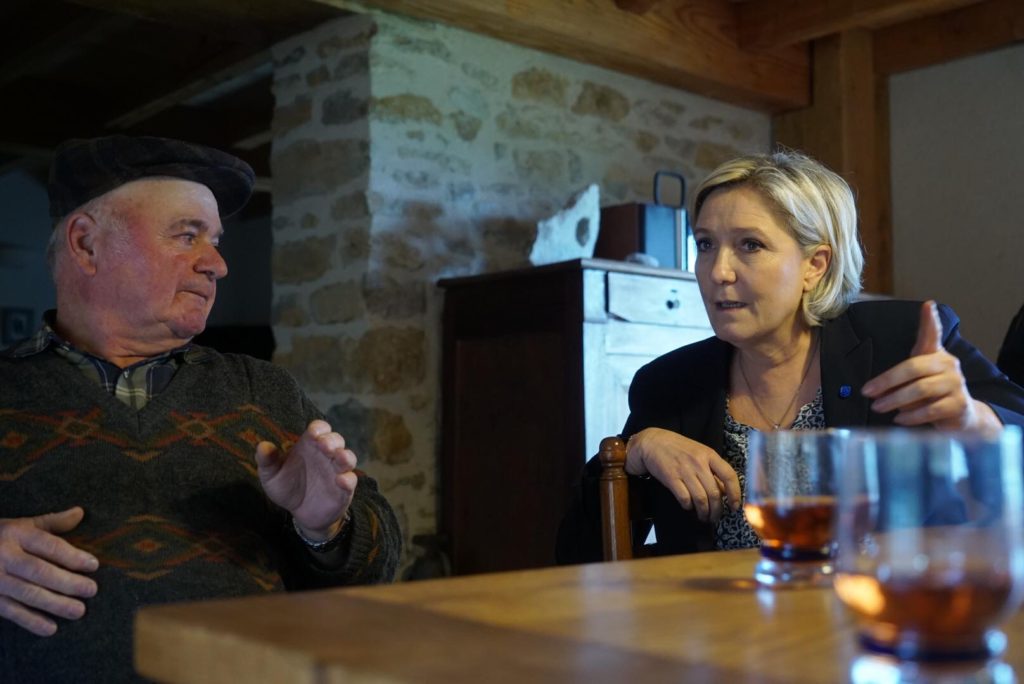
With most of my writing efforts focused on Germany for the past week, I neglected to spend much time writing (or thinking) about last weekend’s referendum in Switzerland, where voters once again rejected an effort to abolish mandatory conscription in the Swiss military.
Swiss voters overwhelmingly opposed abolition — by a vote of 73.2% to 26.8%.
Here’s more background from Reuters:
Under Swiss law, all able-bodied men are required to take part in compulsory military service between the ages of 18 and 34. Recruits complete 18-21 weeks of basic training followed by yearly refresher courses of around 19 days.
Critics say the concept is antiquated, and question the need for an army, which at roughly 150,000 troops is the same size as the Austrian, Belgian, Swedish, Norwegian and Finnish armed forces combined.
It’s a pretty staggering defeat for the anti-conscription and pacifist forces in Switzerland — in December 2001, 21.9% of the electorate voted to replace the Swiss army with a more benign peace force, and in November 1989, fully 35.6% of the electorate voted to abolish the Swiss army altogether.
Why would the Swiss cling so tenaciously to its military force? After all, the Swiss army fought its last war in the Napoleonic Wars in alliance with Great Britain and Russia — and that war ended in 1815. Its tradition of neutrality in international affairs is so strong that it’s not a member of the European Union (though it is part of the European single market and a party to the Schengen free-travel zone) and it joined the United Nations only in 2002.
Swiss defense minister Ueli Maurer argues that abolishing military service could break the link between the Swiss people and its army. But it turns out there are a lot of decent reasons for keeping conscription in place, and they don’t all have to do with the vague notion of ‘tradition.’
At the outset, it’s important to keep in mind that conscription in Switzerland isn’t exactly the same thing as, say, the three-year tour of duty that most Israeli men begin at age 18 (it’s two years for Israeli women). From an economic standpoint, there are opportunity costs to maintaining Swiss conscription, but those costs are far smaller than in a place like Israel because the Swiss conscription commitment is so much smaller.
But there’s also a difference in the nature of the risk as well. Since 2007, Swiss conscripts aren’t even issued a box of ammunition. The risks of a shooting war with neighboring Austria aren’t exactly the same as the very real risks of any number of security challenges that conscripts in the Israeli Defense Forces could face — and have faced in Lebanon and from the Shiite Lebanese group Hezbollah and the Palestinian group Hamas in recent years.
There’s also something to the idea that mandatory conscription forces governments to think harder about the consequences of deploying troops into foreign misadventures. There’s a reason why antiwar Democrats in the 2000s in the United States kept pushing for the reintroduction of a military draft — it’s a way to force all segments of society to feel the gravity of military engagement, and it increases the political costs of putting your military forces in the line of danger. Nonetheless, it’s hard to believe that, but for conscription, Switzerland would have otherwise spent the 20th century engaged in ill-advised martial exercises. (Nor is it necessarily credible that the Swiss army effectively deterred an invasion from Nazi Germany — instead, there’s mounting evidence that the Swiss and their banks were complicit with the Nazi regime).
It’s also important to remember that Switzerland is a federal confederation of 26 highly autonomous cantons with four language-speaking groups of citizens — German, French, Italian and Romansh. The conscription requirement is a way to pull together young individuals from Switzerland’s multiple traditions, so you can think of conscription as less a military obligation and more of a nation-building exercise — or even an exercise in personal and social growth.
There’s something to this, too. Since the end of the Lebanese civil war, the Lebanese military has had this effect, and it’s helped contribute to the wide respect that the military holds in Lebanon. Military service in the United States during World War II brought together young men from very different parts of the country and served as a key catalyst in isolating the American south’s segregation — if black men were capable of fighting and dying in Europe, why shouldn’t they have the same rights as everyone else? Though conscription in the Yugoslav People’s Army until 1992 didn’t stop the disintegration of the Balkans, imagine how much stronger Bosnia and Herzegovina might be today if it instituted the tradition of conscription in a nation-building peacekeeping force.
Continue reading Why do the neutral Swiss love military conscription so much? →

![]()
